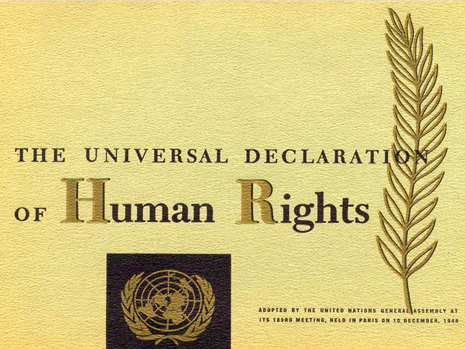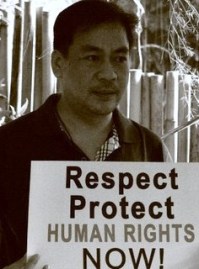 Since 1950, the United Nations has commemorated the historic adoption of the Universal Declaration of Human Rights as a “common standard of achievement for all people and all nations.”
Since 1950, the United Nations has commemorated the historic adoption of the Universal Declaration of Human Rights as a “common standard of achievement for all people and all nations.”
Ironically, on its 64th anniversary today, millions of people around the world still long to realize at least the most basic of this common standard for humanity: the recognition of the “inherent dignity and the equal and inalienable rights of all members of the human family as the foundation of freedom, justice and peace in the world.”
The continuing uprisings in the Arab world, the protests sweeping major cities and urban centers in Europe, the Americas and Africa, the continuing difficult situations in Asia, all highlight deficiencies of human rights in governance and the non-recognition of peoples’ aspirations for inclusion and a desire for meaningful participation in public affairs that affect their lives.
Public demonstrations and assemblies are deeper than mere assertions of the individual’s civil, political, economic and cultural rights. They are demands to take part in decision-making, an assertion of a sovereign power that is abused by many state leaders.
Instead of settling issues through genuine dialogues and consultations, most governments trample basic freedom of expression, assembly and association in the guise of “national interests and security.”
Lately in Singapore, human rights defenders and bus drivers, He Jun Ling, Gao Yue Qiang, Liu Xiangying and Wang Xian Jie, who were employed by the state-controlled public transport operator SMRT Ltd., were charged in court with “inciting an illegal strike” among their co-workers. They protested against poor living conditions in company dormitories and low wages.
In Myanmar, authorities resorted to old violent methods in a clear attempt to silence growing dissent. Riot police attacked protest camps near the Letpadaung mine, setting camps on fire, burning protesting monks and arresting protest organizers Ko Wai Lu, Daw Shan Ma, Ko Myo Chit, Ko Ye Lin, Daw Naw Ohn Hla and Ko Nyi Nyi.
They were calling for environmental protection and reclaiming their lands that were confiscated by the joint venture of China’s Wanbao Company and the military-owned Union of Myanmar Economic Holdings Ltd. There is continuing ethnic violence in Rakhine state and persecution of Rohingya people.
In the Philippines, extrajudicial executions of human rights defenders and mining activists continue. Armed men believed to be hired goons, or associated with private armies and paramilitary groups, carry out most of the killings. Appalling violations are perpetrated by soldiers acting on behalf of private corporations and/or on mere suspicions.
Click here to continue reading
Related articles
- Urgently Adopt all Necessary Measures to Guarantee Life, Integrity, and Safety of HRDs (renatomabunga.wordpress.com)
- Wishin and Hopin on Human Rights Day (sparklemotion18.wordpress.com)
- Human Rights Day 2012 (nichellemitchem.typepad.com)
- UN Office in Armenia marks Human Rights Day (panarmenian.net)
- No Matter Who You Are, Or Where You Live, Your Voice Counts – OpEd (eurasiareview.com)
- Today is International Human Rights Day (lawprofessors.typepad.com)
- Include human rights in school curriculum: Pranab (thehindu.com)
- Human Rights Day, 10 December 2012 (tricitypsychology.com)
- Human Rights Day ~ 10th December (earthtimes.org)


